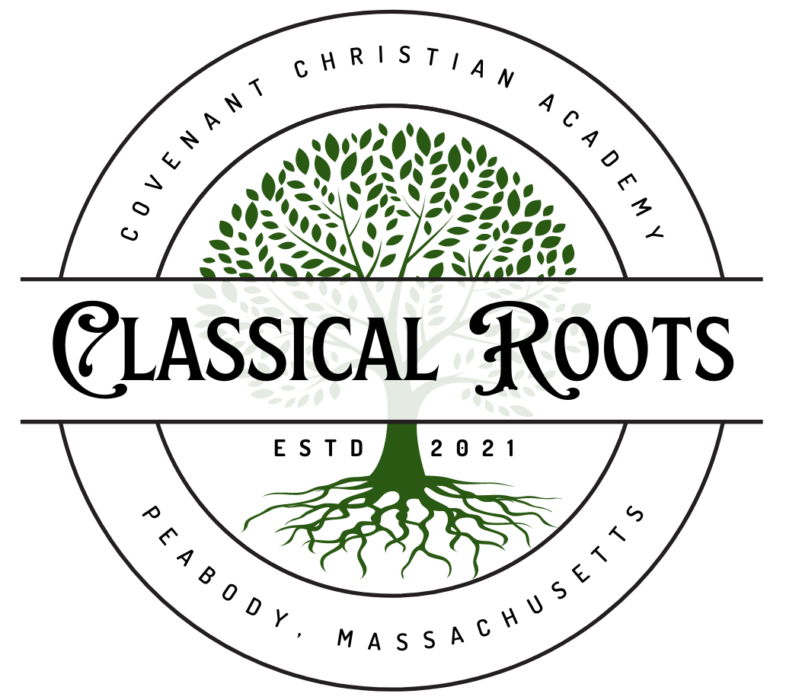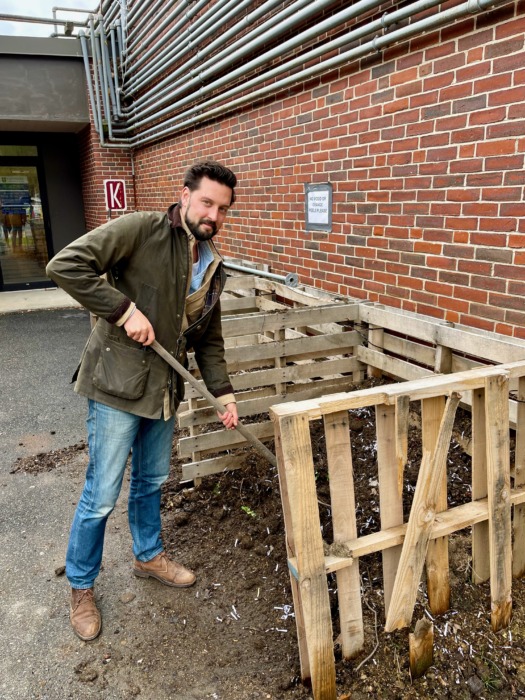

The Classical Roots Program began with a patch of grass. That patch, situated outside of a Logic School classroom on the western end of Covenant’s campus, has since been transformed into a six-bed organic vegetable garden, surrounded by wattle fencing and overlooked by Morello cherry trees and Iceberg roses. Passing by the garden on any given day, you might find a Junior weeding a patch of kale, a Senior staking in a woven bed divider, or a rabbit nibbling the arugula. The garden is an expression of the school’s classical identity. And it is growing.
<aside> 🍂 The garden is an expression of the school’s classical identity. And it is growing.
</aside>
What started as a crazed idea for a 12th-grade literature class now involves more than forty-five student volunteers across the Upper School. This garden has also been integrated into at least three classroom curriculums in the Logic and Rhetoric programs. The program’s growth has been rapid and organic. Our Senior World Literature course, all about the relationship between people and place, asks our prospective graduates to work in the garden while discussing metaphors of soil and growth in the lives of the characters we study. Our AP Chemistry course conducts soil and water studies. Our Logic School life science students wander between the beds and note how plants from the Mediterranean grow best in dry, rocky soil, while English leeks thrive in sand, and mint wanders undeterred no matter where you put it.
Experiences like these, shared between students and faculty, between volunteers and classmates, between people and the earth, are life-giving. As a Classical and Christian school, we know in our bones that humans were designed to be stewards of creation. However, the typical school experience provides few opportunities for us to fulfill that purpose directly. The small garden outside our Logic School began when a few of our faculty and administrators asked each other, “what place could a garden occupy in the life of a Classical Christian school?” What has grown from that garden has been more than a few annual vegetables. Young as it is, the garden has reawakened a broad set of perennial human interests among our students and faculty.
<aside> 🍂 What has grown from that garden has been more than a few annual vegetables. Young as it is, the garden has reawakened a broad set of perennial human interests among our students and faculty.
</aside>
<aside> 🏛️ The brilliant simplicity of a garden as an educational tool should not have come as such a surprise to us: it has been baked into our educational philosophy since its earliest history.
</aside>
Since the Medieval period, monasteries—the cradles of our modern Classical Christian schools—were engaged in agricultural work. This work had both a practical and a formative aspect: it provided medicine and food, but also spiritual discipline and personal nourishment. Thus, the brilliant simplicity of a garden as an educational tool should not have come as such a surprise to us: it has been baked into our educational philosophy since its earliest history. This green space was not something we needed to “fit in” to our classical school—it was a missing piece of the classical puzzle, and a vital one at that.

Image Credit: The Gardens Trust
It became obvious very quickly that a single garden was not going to be enough. Tending the earth in this way, alongside our students and as a part of our curriculums, felt like a natural expression of our school’s identity and core values. In an era of growing environmental awareness, we could teach principles of sustainability and stewardship. In an age of post-industrial, technological workforces, we could reconnect young people to the outdoors. In an epoch of fast living and instant gratification, we could reinforce the truism that all of us, ultimately, are on God’s timetable rather than our own. And along the way, we could foster tenacity, joy, humility, and discernment―each a very necessary gardener’s skill. The harvest we would reap would of course be physical: who doesn’t like to sprinkle fresh basil into their spaghetti sauce, and who in the world can resist the savor of a ripe tomato? But, much more, it would be intellectual and spiritual. We would, in our students and in ourselves, be reaping a new appreciation for truth, beauty, and goodness whose roots would continue to deepen throughout our lifetimes. What could be more natural, or more urgent?
In the end, we launched the Classical Roots Program, a regenerative agriculture program that hopes to integrate the stewardship of creation comprehensively across many aspects of our school’s life. On this website, you can follow the progress of that program as it expands. We have many goals. Among them are the development of outdoor classrooms, the healing of our local biome, and even the planting of an orchard. Of course, as gardeners, we know that all such plans have to be made with crossed fingers and taken with a grain of salt. Even if you prepare the soil well, what you plant often grows in unexpected ways. Sometimes it does not grow at all, and ends up mulching something else that wants to thrive. But here, you can watch as we water it, prune it, uproot bits of it to plant elsewhere, and generally enjoy the harvest.

–Alex Miller, Jr.
Classical Roots Program Steward
Thanks for joining us!
Covenant Christian Academy’s Classical Roots Program is a regenerative agricultural program committed to propagating truth, beauty, and goodness through organic gardening, curriculum integration, and community service. The Classical Roots Program aims to create beautiful and fruitful garden spaces on CCA’s campus that will welcome wildlife, extend our classrooms into the outdoors, heal our local biome, and foster rich conversations about the stewardship of creation.